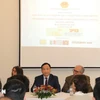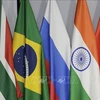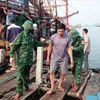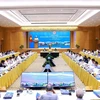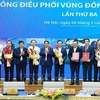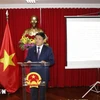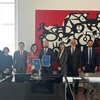It is international law that Vietnam should rely on, Associate Professor cum Doctor Nguyen Ba Dien, Head of the International Law Subject of the Law Faculty under the Hanoi National University said in an interview with the People’s Army newspaper on May 16, regarding China's illegal placement of the drilling rig Haiyang Shiyou-981 deep in Vietnam’s exclusive economic zone.
Associate Professor Dien held that China’s illegal placement of its oil rig in Vietnam’s exclusive economic zone is part of its chain of activities to achieve its goal of taking over the US’s position, becoming the world’s No. 1 super power. To achieve this goal, it is a must for China to control the whole of the East Sea .
To further clarify China’s scheme, the Vietnamese lawyer pointed out some landmarks. Accordingly, in 1956, China used force to occupy a group of islands to the east of Vietnam’s Hoang Sa (Paracel) Archipelago at the time when French administration had just handed over this archipelago to the government of the then Republic of Vietnam. Later on, in January 1974, China continued brazenly mobilizing forces to take control the group of islands to the west of Vietnam ’s Hoang Sa Archipelago, which at that time was ruled by the Republic of Vietnam regime. In 1988, China again attacked several islands of Vietnam such as Gac Ma, Co Lin and Len Dao. Vietnam had bravely fought against China and successfully safeguarded Co Lin and Len Dao Islands . In 1992, China continued invading some islands in Vietnam ’s Truong Sa (Spartly) Archipelago. China also covered some shoals with concrete to create floating structures, illegally occupying part of Truong Sa Archipelago of Vietnam. Continuously, China issued a series of regulations, including the one on the basic line to illegally define the basic line of Hoang Sa Archipelago, which runs counter to the 1982 United Nations Convention on the Law of the Sea (UNCLOS 1982), and decided to establish Sansha city. Since 1999, China has continuously issued fishing bans in the East Sea, violating the jurisdiction as well as the fishing right of Vietnam and other countries’ fishermen. Furthermore, China invited international tenders for 9 oil and gas lots lying deep inside Vietnam ’s exclusive economic zone and continental shelf. Worst still, in 2011, Chinese boats cut cables of PetroVietnam’s seismic survey vessels and most recently, China has brazenly placed an giant oil rig in Vietnam’s exclusive economic zone and continental shelf.
Assoc. Prof. Nguyen Ba Dien affirmed that this is the matter of the time. “In fact, China ’s strategic scheme and ambition to occupy the whole East Sea is unchanged”, he said.
China’s recent acts aim to serve its own long-term goal to be the world’s No.1 super power and at the same time to legalize Hoang Sa Archipelago which China illegally took over from Vietnam.
Since China used force to occupy Hoang Sa Archipelago, it has always refused the discussion to settle the issue. Deliberately placing the drilling rig Haiyang Shiyou-981 in the area which is 18 nautical miles from Tri Ton Island, China attempted to show that the area belongs to the exclusive economic zone of Tri Ton Island, part of Vietnam’s Hoang Sa Archipelago, which China had illegally occupied. Obviously, China wants to turn the undisputed area into the disputed one. “The evil-minded aim of China is to materialize its groundless “nine-dash line” claim to possess both Hoang Sa and Truong Sa Archipelagoes and 80 per cent of the East Sea”, the professor stressed.
Assoc. Prof. Nguyen Ba Dien also pointed out that China’s recent acts in the East Sea is in violation of international law. Firstly, China has infringed what stipulated in the Charter of the United Nations (UN) while China is a permanent member of the UN Security Council. A major principle to rule world peace and security in the world is that the use of force and the threat to use force in international relations should be prohibited. Specifically, China has violated clause 1 of Article 2 of the UN Charter. Under this clause, China has defied its obligation of respecting Vietnam ’s territorial integrity and sovereign right when it used force to occupy Vietnam’s Hoang Sa Archipelago and step by step took over Vietnam ’s Truong Sa Archipelago, especially when it made use of the occupied island to encroach Vietnam ’s sovereign right.
China has also violated clause 3 of Article 2 of the UN Charter which stipulates that international disputes shall be settled by peaceful means. When placing the drilling rig Haiyang Shiyou-981, China used force, such as aircraft and vessels, to approach and ram Vietnam’s vessels and even fired water cannons at Vietnam’s fisheries surveillance force and Vietnam Coast Guard vessels, damaging many Vietnamese vessels and injuring many members of the Vietnam fisheries surveillance force.
Moreover, China has infringed clause 4 of Article 2 of the UN Charter, which stresses that the principle of refrain from threat or the use of force in international relations. China has also violated Article 33 in the UN Charter regulating the use of peaceful means to settle international disputes. What is more, China has defied one of 7 big principles of the UN Charter is “fulfill in good faith the obligations assumed by them”.
China’s recent illegal act has seriously infringed the UNCLOS 1982 as well. Accordingly, China has violated Vietnam ’s sovereign right and jurisdiction on its exclusive economic zone and continental shelf; the definition of basic lines of archipelagoes as well as the Article 121 of the UNCLOS 1982. It is obvious that China has defied regulations relating to safety area of man-made equipment and structures. The clauses 4 and 5 of Article 60 and Article 80 of the UNCLOS 1982 rule that the coastal state may, where necessary, establish reasonable safety zones around such artificial islands, installations and structures and that zone shall not exceed a distance of 500 metres around them, measured from each point of their outer edge.
Over the past days, China has announced the safety zone around its illegally- placed oil rig is one nautical mile and increased it to three nautical miles and now 10 nautical miles in reality. That is a perverse violation act.
Additionally, China has violated the Declaration on the Conduct of Parties in the East Sea (DOC) between ASEAN and China as well as the agreement on the fundamental principles guiding the settlement of issues at sea signed by Vietnam and China in Beijing, China in 2011.
China has also seriously violated the major principle on actual occupation regulated in the international law. Under this principle, a state has legal occupation of land, islands or a waters when it first occupies publicly and peacefully and exercises its right continuously. Besides, that occupation must be under state form. All international legal precedents admit only one state having its sovereignty over waters and islands when it exercises that basing on the actual occupation principle. Regarding China ’s acts towards Hoang Sa and Truong Sa Archipelagoes, it is clear that China has used force instead of peaceful means.
Asked whether Vietnam should bring China’s acts of violation against Vietnam’s sovereignty to international bodies, Professor Nguyen Ba Dien stressed that Vietnam has no choice rather to rely on international law. Responding to China’s provocative acts, the Vietnamese people including overseas Vietnamese, over the past days, have shown their solidarity and backed the Party and the Government with the determination of safeguarding the national sea and islands in a peaceful manner.
China’s acts against Vietnam’s territorial sovereignty are illegal. China’s ambition and claims have been unreasonable and not basing on the law of civilization and the era but the law of power.
Considering above-mentioned acts, it is clear that international law is not in favour of China if those violations are brought to international bodies.
Affirming that Vietnam can bring China’s acts of violating Vietnam’s territorial sovereignty to international organizations, the professor regards the UN General Assembly, including the UN Security Council, UN General Secretary, the International Court of Justice, International Court of Arbitration, International Court on the Law of the Sea and others.
However, he recommended that there should be a suitable roadmap, methods and thorough consideration before bringing the case to international forums. Thus, Vietnam should well prepare legal files, evidences, argument and people and political determination as well as combined strength of the entire people and international solidarity.
On the ground, Vietnam should not allow China to encroach an inch of its territory and must remove Chinese oil rig from Vietnam . The professor said that Vietnam should not use force or open fire first. It does not mean that Vietnam has no self-defence right. Under Article 51 of the UN Charter, a state can exercise self-defence in case a foreign state uses force and threat to use force to infringe its independent sovereignty, sovereign right and jurisdiction. “That is the last measure”, he said, adding that Vietnam should use the power of justice-international law while China has not.
“Vietnam has adequate historical, scientific evidences and arguments to confirm its undisputable sovereignty over its Truong Sa and Hoang Sa Archipelagoes and its sovereign right and jurisdiction over its territorial waters in the East Sea . International arbitration and international court are the just intermediary to support Vietnam in proving and safeguarding its sovereignty”, the professor concluded.-VNA
Associate Professor Dien held that China’s illegal placement of its oil rig in Vietnam’s exclusive economic zone is part of its chain of activities to achieve its goal of taking over the US’s position, becoming the world’s No. 1 super power. To achieve this goal, it is a must for China to control the whole of the East Sea .
To further clarify China’s scheme, the Vietnamese lawyer pointed out some landmarks. Accordingly, in 1956, China used force to occupy a group of islands to the east of Vietnam’s Hoang Sa (Paracel) Archipelago at the time when French administration had just handed over this archipelago to the government of the then Republic of Vietnam. Later on, in January 1974, China continued brazenly mobilizing forces to take control the group of islands to the west of Vietnam ’s Hoang Sa Archipelago, which at that time was ruled by the Republic of Vietnam regime. In 1988, China again attacked several islands of Vietnam such as Gac Ma, Co Lin and Len Dao. Vietnam had bravely fought against China and successfully safeguarded Co Lin and Len Dao Islands . In 1992, China continued invading some islands in Vietnam ’s Truong Sa (Spartly) Archipelago. China also covered some shoals with concrete to create floating structures, illegally occupying part of Truong Sa Archipelago of Vietnam. Continuously, China issued a series of regulations, including the one on the basic line to illegally define the basic line of Hoang Sa Archipelago, which runs counter to the 1982 United Nations Convention on the Law of the Sea (UNCLOS 1982), and decided to establish Sansha city. Since 1999, China has continuously issued fishing bans in the East Sea, violating the jurisdiction as well as the fishing right of Vietnam and other countries’ fishermen. Furthermore, China invited international tenders for 9 oil and gas lots lying deep inside Vietnam ’s exclusive economic zone and continental shelf. Worst still, in 2011, Chinese boats cut cables of PetroVietnam’s seismic survey vessels and most recently, China has brazenly placed an giant oil rig in Vietnam’s exclusive economic zone and continental shelf.
Assoc. Prof. Nguyen Ba Dien affirmed that this is the matter of the time. “In fact, China ’s strategic scheme and ambition to occupy the whole East Sea is unchanged”, he said.
China’s recent acts aim to serve its own long-term goal to be the world’s No.1 super power and at the same time to legalize Hoang Sa Archipelago which China illegally took over from Vietnam.
Since China used force to occupy Hoang Sa Archipelago, it has always refused the discussion to settle the issue. Deliberately placing the drilling rig Haiyang Shiyou-981 in the area which is 18 nautical miles from Tri Ton Island, China attempted to show that the area belongs to the exclusive economic zone of Tri Ton Island, part of Vietnam’s Hoang Sa Archipelago, which China had illegally occupied. Obviously, China wants to turn the undisputed area into the disputed one. “The evil-minded aim of China is to materialize its groundless “nine-dash line” claim to possess both Hoang Sa and Truong Sa Archipelagoes and 80 per cent of the East Sea”, the professor stressed.
Assoc. Prof. Nguyen Ba Dien also pointed out that China’s recent acts in the East Sea is in violation of international law. Firstly, China has infringed what stipulated in the Charter of the United Nations (UN) while China is a permanent member of the UN Security Council. A major principle to rule world peace and security in the world is that the use of force and the threat to use force in international relations should be prohibited. Specifically, China has violated clause 1 of Article 2 of the UN Charter. Under this clause, China has defied its obligation of respecting Vietnam ’s territorial integrity and sovereign right when it used force to occupy Vietnam’s Hoang Sa Archipelago and step by step took over Vietnam ’s Truong Sa Archipelago, especially when it made use of the occupied island to encroach Vietnam ’s sovereign right.
China has also violated clause 3 of Article 2 of the UN Charter which stipulates that international disputes shall be settled by peaceful means. When placing the drilling rig Haiyang Shiyou-981, China used force, such as aircraft and vessels, to approach and ram Vietnam’s vessels and even fired water cannons at Vietnam’s fisheries surveillance force and Vietnam Coast Guard vessels, damaging many Vietnamese vessels and injuring many members of the Vietnam fisheries surveillance force.
Moreover, China has infringed clause 4 of Article 2 of the UN Charter, which stresses that the principle of refrain from threat or the use of force in international relations. China has also violated Article 33 in the UN Charter regulating the use of peaceful means to settle international disputes. What is more, China has defied one of 7 big principles of the UN Charter is “fulfill in good faith the obligations assumed by them”.
China’s recent illegal act has seriously infringed the UNCLOS 1982 as well. Accordingly, China has violated Vietnam ’s sovereign right and jurisdiction on its exclusive economic zone and continental shelf; the definition of basic lines of archipelagoes as well as the Article 121 of the UNCLOS 1982. It is obvious that China has defied regulations relating to safety area of man-made equipment and structures. The clauses 4 and 5 of Article 60 and Article 80 of the UNCLOS 1982 rule that the coastal state may, where necessary, establish reasonable safety zones around such artificial islands, installations and structures and that zone shall not exceed a distance of 500 metres around them, measured from each point of their outer edge.
Over the past days, China has announced the safety zone around its illegally- placed oil rig is one nautical mile and increased it to three nautical miles and now 10 nautical miles in reality. That is a perverse violation act.
Additionally, China has violated the Declaration on the Conduct of Parties in the East Sea (DOC) between ASEAN and China as well as the agreement on the fundamental principles guiding the settlement of issues at sea signed by Vietnam and China in Beijing, China in 2011.
China has also seriously violated the major principle on actual occupation regulated in the international law. Under this principle, a state has legal occupation of land, islands or a waters when it first occupies publicly and peacefully and exercises its right continuously. Besides, that occupation must be under state form. All international legal precedents admit only one state having its sovereignty over waters and islands when it exercises that basing on the actual occupation principle. Regarding China ’s acts towards Hoang Sa and Truong Sa Archipelagoes, it is clear that China has used force instead of peaceful means.
Asked whether Vietnam should bring China’s acts of violation against Vietnam’s sovereignty to international bodies, Professor Nguyen Ba Dien stressed that Vietnam has no choice rather to rely on international law. Responding to China’s provocative acts, the Vietnamese people including overseas Vietnamese, over the past days, have shown their solidarity and backed the Party and the Government with the determination of safeguarding the national sea and islands in a peaceful manner.
China’s acts against Vietnam’s territorial sovereignty are illegal. China’s ambition and claims have been unreasonable and not basing on the law of civilization and the era but the law of power.
Considering above-mentioned acts, it is clear that international law is not in favour of China if those violations are brought to international bodies.
Affirming that Vietnam can bring China’s acts of violating Vietnam’s territorial sovereignty to international organizations, the professor regards the UN General Assembly, including the UN Security Council, UN General Secretary, the International Court of Justice, International Court of Arbitration, International Court on the Law of the Sea and others.
However, he recommended that there should be a suitable roadmap, methods and thorough consideration before bringing the case to international forums. Thus, Vietnam should well prepare legal files, evidences, argument and people and political determination as well as combined strength of the entire people and international solidarity.
On the ground, Vietnam should not allow China to encroach an inch of its territory and must remove Chinese oil rig from Vietnam . The professor said that Vietnam should not use force or open fire first. It does not mean that Vietnam has no self-defence right. Under Article 51 of the UN Charter, a state can exercise self-defence in case a foreign state uses force and threat to use force to infringe its independent sovereignty, sovereign right and jurisdiction. “That is the last measure”, he said, adding that Vietnam should use the power of justice-international law while China has not.
“Vietnam has adequate historical, scientific evidences and arguments to confirm its undisputable sovereignty over its Truong Sa and Hoang Sa Archipelagoes and its sovereign right and jurisdiction over its territorial waters in the East Sea . International arbitration and international court are the just intermediary to support Vietnam in proving and safeguarding its sovereignty”, the professor concluded.-VNA

